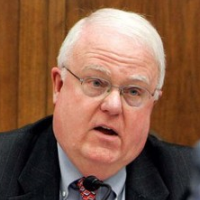Conservative Co-Author of Patriot Act Readies Bipartisan Bill to Curb NSA Overreach

The Republican lawmaker who helped create the Patriot Act (pdf) says the National Security Agency (NSA) has gone too far in snooping on Americans, and wants Congress to adopt bipartisan legislation to curtail the agency’s domestic spying.
Representative Jim Sensenbrenner (R-Wisconsin) has prepared a far-reaching bill that would curtail intelligence agencies’ domestic surveillance powers under the Patriot Act. Senator Patrick Leahy (D-Vermont), chairman of the Senate Judiciary Committee, has authored a matching bill.
A key focus of Sensenbrenner’s bill is to tighten Section 215 of the Patriot Act to limit the NSA’s collection of business records, such as telephone metadata. The lawmaker claims that the language in that section has been improperly interpreted by the Foreign Intelligence Surveillance Court, thereby allowing the NSA’s vast collection of phone-record information belonging to Americans.
Sensenbrenner pointed out that NSA director Keith Alexander cited only 13 cases in which individuals of interest were discovered after scanning all Americans’ phone call records (with only one or two suspected plots being identified). That “haystack approach” to hunting for terrorist plots “missed the Boston marathon bombing, and that was after the Russians told us the Tsarnaev brothers were bad guys,” Sensenbrenner told The Guardian.
Now, says Sensenbrenner, it is time “to put [the NSA’s] metadata program out of business.”
Sensenbrenner’s bill, named the USA Freedom Act (for Uniting and Strengthening America by Fulfilling Rights and Ending Eavesdropping, Dragnet-Collection, and Online Monitoring) would do the following:
- Limit the collection of phone records to known terrorist suspects
- End “secret laws” by making courts disclose surveillance policies
- Create a special court advocate to represent privacy interests
- Allow companies to disclose how many requests for users’ information they receive from the government
- Restrict a loophole involving overseas surveillance that has allowed the NSA to target Internet and email activities of Americans.
The U.S. House of Representatives tried to curb the NSA’s bulk collection of information during the summer. But that measure was voted down, 217 to 205.
Sensenbrenner, however, is optimistic that support has grown since then among his colleagues for reining in the NSA.
“Opinions have hardened with the revelations over the summer, particularly the inspector general’s report that there were thousands of violations of regulations, and the disclosure that NSA employees were spying on their spouses or significant others, which was very chilling,” he told The Guardian.
But his plan may encounter a key obstacle in the Senate: Democrat Dianne Feinstein of California, who chairs the intelligence committee.
Feinstein has been supportive of the NSA, and her own reform bill does not ban the agency’s collection of metadata.
Sensenbrenner has dismissed Feinstein’s approach, and even questioned the independence of her committee.
“I do not want to see Congress pass a fig leaf because that would allow the NSA to say ‘Well, we’ve cleaned up our act’ until the next scandal breaks,” he told the newspaper. “[Party leaders] are going to have to review what kind of people they put on the intelligence committee. Oversight is as good as the desire of the chairman to do it.”
-Noel Brinkerhoff
To Learn More:
Patriot Act Author Prepares Bill to Put NSA Bulk Collection 'Out of Business' (by Dan Roberts, The Guardian)
U.S. and UK are Abusing Anti-Terrorism Laws, Claim the Laws’ Authors (by Noel Brinkerhoff, AllGov)
FBI’s Use of Patriot Act to Secretly Obtain Americans’ Business Records Increased by 1,000% Under Obama (by Noel Brinkerhoff and Danny Biederman, AllGov)
- Top Stories
- Unusual News
- Where is the Money Going?
- Controversies
- U.S. and the World
- Appointments and Resignations
- Latest News
- Musk and Trump Fire Members of Congress
- Trump Calls for Violent Street Demonstrations Against Himself
- Trump Changes Name of Republican Party
- The 2024 Election By the Numbers
- Bashar al-Assad—The Fall of a Rabid AntiSemite






Comments